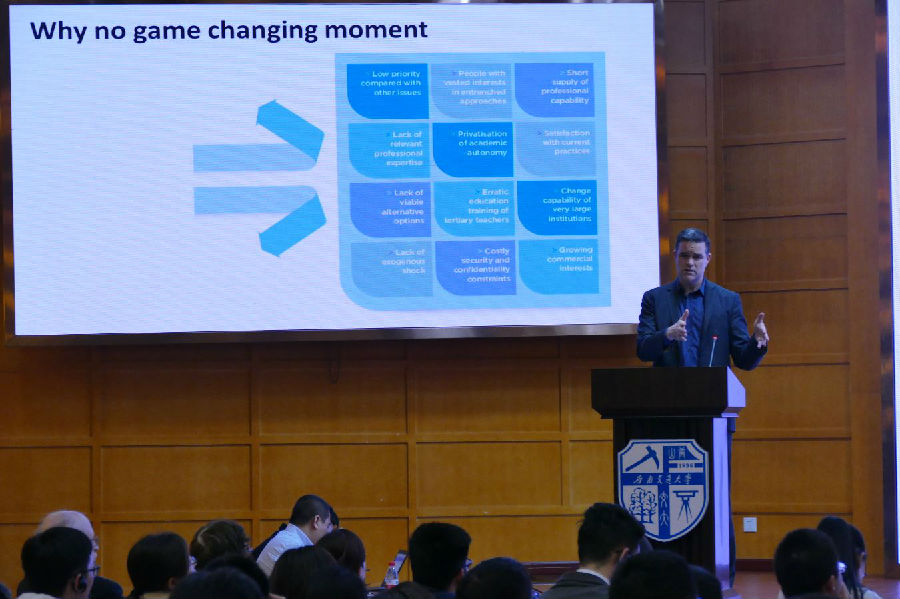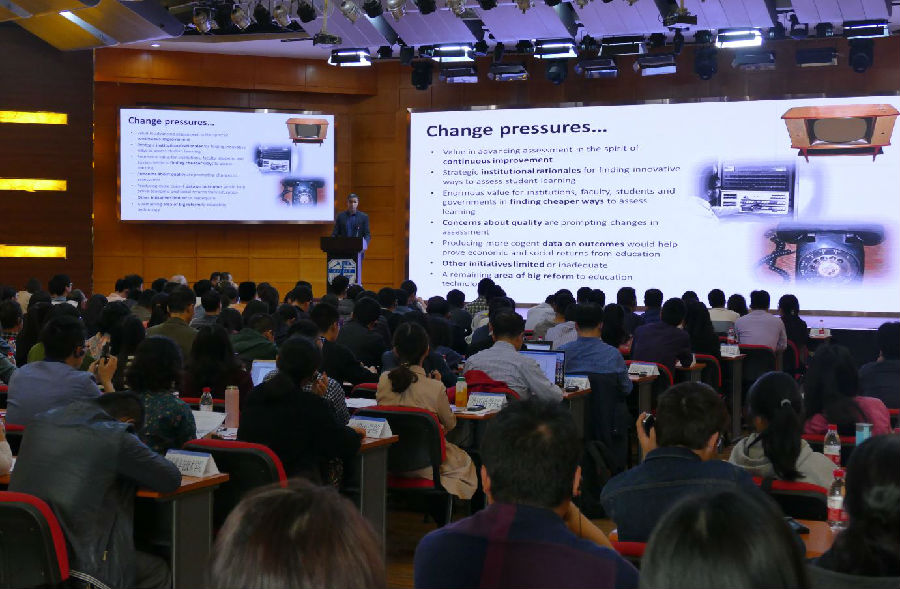为顺应新时代高等教育的发展形势,促进学校本科人才培养内涵式发展,围绕一流学科建设,服务学校战略目标。4月16日下午,由教务处主办的2018年西南交通大学面向未来的深层学习体验与评价论坛在九里校区国际会议厅举行。本次论坛特别邀请到我院长聘教授、全球学校与学生发展评价中心副主任Hamish Coates教授参加并做主题演讲。
Professor Hamish Coates (Tsinghua University Institute of Education and Deputy Director of the Tsinghua University Global Research Centre for the Assessment of College and Student Development) gave a speech at the South West Jiao Tong University Conference on the opportunity to improve higher education by making great strides in the assessment of student learning.

Hamish Coates发表题为“Next Generation Higher Education Assessment”的主旨演说,他提出,目前的高等教育正在改变,高等教育正适应新的逻辑,高等教育扩展的贡献帮助实现教育成功,从而实现教育的价值,通过获得教育的投资评估来帮助高等教育扩张。
在Hamish Coates教授看来,在过去的20年间,评价的方式并没有明显的改变,传统评价方式存在着诸多不足,检验学生手段的单一化使得学生无法掌握多种类型的知识;因此教育者无法为学生提供足够的反馈,也无法充分地了解学生学习哪些知识。
亟待变化的压力也使得评价体系必须以现代化方式面向未来。出于对质量的追求,教育者应采用创新的方法评估学生。因此评估不是依靠经验,应当讲究科学方法,通过创新性措施来提高评估质量。
Hamish Coates教授提出,高等教育历经三个发展阶段:最开始的阶段采用非常传统的教学手段,这种教学手段有着一定优势,因此一直延续到这个世纪20年代,但在未来并没有足够的活力。对于下一代而言,交互式学习,非固定教学地点教学,现代教学技术将会被更多的运用到教育领域。同时,高等教育也需要重新设计的思想,需要改变。老师应当把评估设计成更容易接受的形式,让学生们利用不同的方法有见识地学习;老师应重新设计评估价值观,通过随机数据设立标准,按照不同学科设计不同类型的评估模型,切实提高评估质量。

He argued that it is time to re-think higher education assessments for the next-generation. Delivering higher education assessments online will transform efficiencies in a system already estimated to cost into the billions.
Student assessment is a pillar of higher education. It bookends who gets in and gets out, signposts achievement, gatekeeps education standards, and it is in dire need of reform. At the moment, much assessment evolves from existing materials and there can be large and undocumented task variants. This creates inefficiencies in time management and outcomes. But when people born this year enter university they will experience very different assessment practices to those in widespread use today. They will experience ‘next generation assessment’.
Professor Coates revealed this new way forward, speaking to his recent research briefing on next generation assessment. The briefing outlines an online framework that will transform the standards and productivity of higher education and improve the student experience. Resources will be produced by education engineers who share a scientific commitment to their profession. Assessment will yield tailored insights for a range of audiences that help people move seamlessly through study and work.
There are strategic institutional rationales for finding innovative ways to assess student learning. Graduate employer and business concerns about education standards ultimately fall back to those about assessment. By doing assessment better and cheaper there is enormous educational and financial value to be found for institutions, faculty, students and governments.
Assessment matters enormously to higher education. This research briefing invites people with vested interests in higher education to recognise current problems and imagine the shape of things to come.